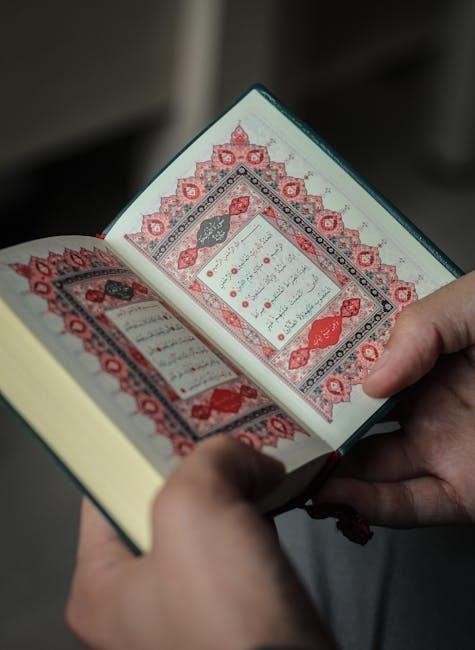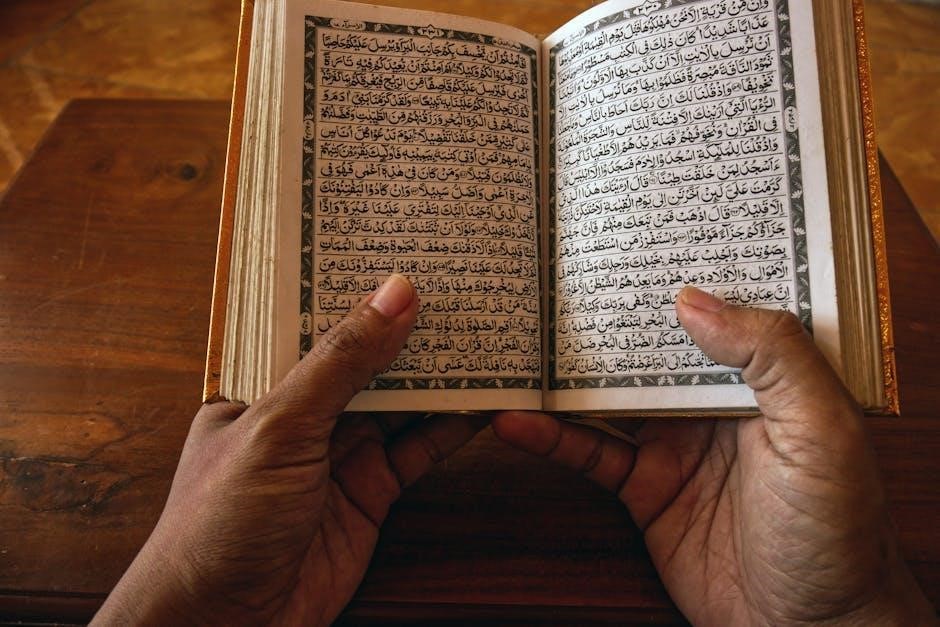Misty PDF is an intriguing digital publication that has recently gained attention for its unique storytelling and visual elements, making it a popular topic of discussion online, particularly among literature enthusiasts.
1.1 Overview of Misty PDF

Misty PDF is a digital publication that has garnered significant attention for its unique approach to storytelling and character development. It explores themes of identity, relationships, and personal growth, resonating with a wide audience. The document is known for its engaging narrative style and the use of visual elements to enhance the reader’s experience. Misty PDF has become a popular topic of discussion online, particularly among fans of contemporary literature and those interested in innovative storytelling techniques.
The publication’s structure and formatting are designed to be both aesthetically pleasing and user-friendly, making it accessible to readers across various platforms. Its availability has sparked debates and critiques, further cementing its place in modern literary discourse.

1.2 Importance of Misty PDF in Modern Context
Misty PDF holds significant relevance in today’s digital age, offering a fresh perspective on storytelling and character development. Its emphasis on visual and narrative elements caters to modern readers’ preferences for engaging, multimedia-rich content. The document’s ability to spark discussions about identity, relationships, and personal growth aligns with contemporary themes of self-discovery and societal change. Additionally, its accessibility across platforms highlights its adaptability to the evolving digital landscape, making it a valuable resource for both entertainment and educational purposes. Misty PDF’s cultural and social resonance underscores its importance in fostering meaningful conversations in modern society.

Creation and Development of Misty PDF
Misty PDF was crafted through a blend of innovative storytelling and visual elements, designed to captivate modern audiences with its engaging narrative and artistic presentation.
2.1 Inspiration Behind Misty PDF
The inspiration for Misty PDF stems from a blend of contemporary storytelling and timeless themes, aiming to resonate with readers seeking both entertainment and intellectual stimulation. Drawing from various cultural influences, it captures the essence of modern narratives while maintaining a unique voice. The creators focused on crafting relatable characters and intricate plots, ensuring the content appeals to a diverse audience. This approach reflects a deep understanding of what captivates readers in the digital age, making Misty PDF a standout in its genre.
2.2 Design and Layout of Misty PDF
The design and layout of Misty PDF are crafted to enhance readability and visual appeal. The document features a clean, modern format with strategic use of typography, spacing, and imagery. Each page is carefully organized to ensure a seamless reading experience, with clear section breaks and intuitive navigation. The incorporation of high-quality visuals complements the text, making the content more engaging. The layout is optimized for both digital viewing and printing, ensuring versatility for different audiences. This thoughtful design reflects a commitment to providing a professional and aesthetically pleasing publication.
Key Themes in Misty PDF
Misty PDF explores themes of storytelling, character growth, and emotional depth, blending fiction with real-world insights to create a compelling narrative that resonates with readers.
3.1 Exploration of Character Development
Misty PDF delves into the intricate evolution of its characters, showcasing their growth through emotional depth and relatable interactions. Misty, the central figure, is portrayed with vulnerabilities and strengths, making her journey compelling. The narrative highlights her transformation, influenced by pivotal moments and relationships. Secondary characters also undergo significant development, adding layers to the story. Themes of friendship, ambition, and self-discovery are woven into their arcs, creating a rich tapestry of personalities. This focus on character evolution enhances the reader’s connection to the narrative, making Misty PDF a memorable and engaging read.
3.2 Analysis of Storytelling Techniques
Misty PDF employs a captivating narrative style, blending emotional depth with relatable scenarios. The storytelling techniques include dynamic character interactions and a heartfelt speech by Misty to Jessica, showcasing authenticity. Visual and descriptive elements enhance the plot, making themes like ambition and friendship resonate deeply. The narrative’s ability to weave fiction with real-life emotions highlights its storytelling prowess. This approach ensures the story remains engaging and thought-provoking, appealing to a wide audience while maintaining a personal touch that keeps readers invested in the journey.

Structure and Formatting of Misty PDF
Misty PDF features a well-organized layout with clear sections and visually appealing elements, ensuring readability and engagement. Its clean formatting enhances the storytelling experience, making it user-friendly.
4.1 Organization of Content
Misty PDF is structured with clear chapters and sections, ensuring a logical flow of information. The content is divided into thematic segments, making it easy for readers to navigate and follow the narrative. Each chapter builds upon the previous one, maintaining a coherent progression of ideas. The use of headings and subheadings further enhances readability, while bullet points and short paragraphs break down complex topics into digestible parts. Visual elements like images and diagrams are strategically placed to complement the text, ensuring a balanced and engaging reading experience. This organization not only enhances comprehension but also makes the document visually appealing and user-friendly.
4.2 Use of Visual Elements
Misty PDF incorporates a variety of visual elements to enhance the reading experience. High-quality images, diagrams, and charts are strategically placed to illustrate key points and break up text. These visuals not only complement the narrative but also aid in understanding complex concepts. The use of color schemes and typography adds to the aesthetic appeal, making the document visually engaging. Additionally, infographics and illustrations are used to present data in an accessible format, ensuring that readers can grasp information quickly and efficiently. This balanced approach to visuals ensures the content remains both informative and visually appealing. The design is modern and professional, catering to a broad audience.

Impact and Reception of Misty PDF

Misty PDF has garnered significant attention for its engaging content and innovative design, resonating with readers globally and sparking meaningful discussions across various online platforms.
5.1 Audience Response and Feedback
The audience response to Misty PDF has been overwhelmingly positive, with readers praising its engaging storytelling and visual appeal. Many have highlighted its ability to evoke emotional connections, making it a standout in modern digital literature. The unique blend of narrative and design has resonated deeply with readers, fostering lively discussions across online communities. Fans particularly commend the heartfelt speech by Misty in episode 9, emphasizing its authenticity and impact. The PDF’s popularity continues to grow, solidifying its place as a favorite among literature enthusiasts seeking compelling and visually enriching experiences.
5.2 Critical Reviews and Analysis
Critical reviews of Misty PDF highlight its emotional depth and storytelling prowess, with many praising its unique narrative structure. Critics note the PDF’s ability to blend heartfelt moments, such as Misty’s speech in episode 9, with visually engaging elements. While some reviewers commend its originality, others argue its pacing could be refined. The publication’s educational potential is also a topic of scholarly discourse, as it serves as a compelling example of modern digital storytelling. Overall, Misty PDF has garnered significant acclaim for its creative approach to literature and its resonance with contemporary themes.

Availability and Access to Misty PDF

Misty PDF is accessible through various online platforms, including Amazon and Google Books, ensuring easy download for readers worldwide while adhering to legal guidelines;
6.1 Platforms for Downloading Misty PDF
Misty PDF is available for download on popular platforms like Amazon Kindle, Google Books, and educational repositories. Users can also access it through academic databases and eBook stores. Additionally, some websites offer free previews, enabling readers to sample content before purchasing. The PDF is compatible with various devices, ensuring accessibility for a broad audience. Always verify the authenticity of the source to avoid unauthorized versions. This wide availability makes Misty PDF easily accessible to readers worldwide, fostering its growing popularity in digital literature.
6.2 Legal and Ethical Considerations
When accessing Misty PDF, it is crucial to adhere to legal and ethical standards. Purchasing or downloading the document from authorized platforms ensures compliance with copyright laws. Users must respect licensing agreements, which often restrict unauthorized sharing or distribution. Ethical considerations include avoiding illegal downloads and supporting creators by purchasing legitimate copies. Additionally, respecting intellectual property rights is essential to maintain the integrity of the work. Always verify the source of the PDF to ensure it is legally distributed and avoid contributing to copyright infringement.
Cultural and Social Significance
Misty PDF reflects diverse perspectives, fostering cultural dialogue and social understanding through its narratives and themes, making it a meaningful resource for exploring societal values and representation.
7.1 Representation in Media
Misty PDF offers a unique lens through which diverse voices and narratives are amplified, ensuring representation across various cultural and social identities. By incorporating characters and storylines that reflect real-world diversity, Misty PDF challenges stereotypes and promotes inclusivity. Its ability to weave complex societal issues into engaging narratives makes it a powerful tool for fostering empathy and understanding. The publication’s commitment to representation resonates deeply with audiences, encouraging broader conversations about identity and equity in media. This approach not only enriches the storytelling experience but also sets a benchmark for inclusive media practices in the digital age.
7.2 Influence on Contemporary Literature
Misty PDF has emerged as a significant influence in contemporary literature, inspiring authors with its innovative storytelling techniques and emotional depth. Its ability to weave intricate narratives and explore complex human experiences has set a new benchmark for writers. The publication’s focus on character development and cultural insights has encouraged a shift toward more inclusive and thought-provoking storytelling. By challenging traditional literary norms, Misty PDF has become a catalyst for innovation, motivating creators to experiment with diverse genres and themes. Its impact is evident in the growing number of authors adopting similar styles, making it a cornerstone of modern literary evolution.
Challenges and Controversies
Misty PDF has faced challenges, including intellectual property disputes and cultural misrepresentation claims. Critics argue its content occasionally blurs fact and fiction, sparking ethical debates among readers and scholars.
8;1 Criticisms and Debates Surrounding Misty PDF
Some critics argue that Misty PDF raises concerns about intellectual property rights, as its content occasionally overlaps with existing works. Additionally, debates arise regarding its portrayal of sensitive cultural themes, with some accusing it of misrepresentation. Legal and ethical questions about digital rights management and access restrictions have also sparked discussions. While supporters praise its innovative storytelling, others highlight the need for clearer boundaries between original and derivative content. These controversies underscore the complexities of modern digital publishing and the challenges of balancing creativity with responsibility.
8.2 Addressing Misconceptions
Despite its popularity, Misty PDF has faced misconceptions regarding its content and purpose. Some believe it is merely a fictional narrative, while others assume it lacks educational value. However, the document delve into complex themes like character development and storytelling techniques, offering insights into modern literature. Additionally, its digital format has led to misconceptions about its accessibility, but it is widely available on various platforms. By clarifying these misunderstandings, readers can better appreciate Misty PDF as both an engaging and intellectually stimulating resource, challenging preconceived notions about its nature and significance.

Educational and Research Value
Misty PDF serves as a valuable resource for academic and research purposes, offering insights into storytelling techniques and character development, while fostering discussions in scholarly communities and educational settings.
9.1 Use in Academic Settings
Misty PDF is increasingly being utilized in academic environments for its rich narrative content and structured format. Educators incorporate it into curriculum design, particularly in literature and language courses, to teach storytelling techniques and character development. The PDF’s engaging visual elements and thematic depth make it an ideal resource for fostering critical thinking and analytical skills among students. Additionally, its availability on various digital platforms ensures accessibility, allowing researchers and scholars to reference it in their studies. This versatility positions Misty PDF as a valuable tool for both teaching and scholarly discourse.
9.2 Contribution to Scholarly Discourse
Misty PDF has become a subject of interest in scholarly discussions, particularly in fields like literature and media studies. Its unique narrative structure and thematic depth provide fertile ground for analysis, encouraging researchers to explore its implications on modern storytelling. Scholars appreciate its accessibility, as the PDF format allows for easy distribution and reference in academic papers. Misty PDF’s exploration of character development and storytelling techniques has also sparked debates about the evolution of digital literature. Its contribution to scholarly discourse lies in its ability to bridge gaps between traditional and contemporary narrative forms, offering fresh perspectives for researchers.
Misty PDF offers a unique blend of storytelling and visual elements, making it a significant and impactful digital publication with a promising future in contemporary literature.
10.1 Summary of Key Points
Misty PDF is a transformative digital publication that combines compelling storytelling with visually engaging elements, making it a standout in contemporary literature. Its ability to blend emotional depth with artistic presentation has resonated widely, fostering meaningful discussions about its cultural and social implications. The document has also proven valuable in educational settings, offering insights into character development and narrative techniques. Overall, Misty PDF represents a significant contribution to modern media, leaving a lasting impression on readers and scholars alike.
10.2 Future Prospects for Misty PDF
Misty PDF holds promising potential for growth, with advancements in digital storytelling and interactive content expected to enhance its appeal. As technology evolves, the integration of immersive visuals and dynamic narratives could further elevate its impact. Expanded distribution across global platforms may broaden its audience, fostering cultural exchange and literary appreciation. Additionally, collaborations with creators and educators could deepen its educational and research value, solidifying its role in contemporary literature. The future of Misty PDF is poised for innovation, ensuring its relevance and influence in the digital age.






























